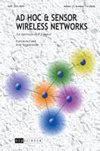On the Robustness of Root Locus based Routing Attack-Detection in Reconfigurable Wireless Networks
IF 0.6
4区 计算机科学
Q4 COMPUTER SCIENCE, INFORMATION SYSTEMS
引用次数: 0
Abstract
Data routing is one of the most essential functions having a direct impact on network performance. Due to the lack of any fixed infrastructure, data routing must be achieved through collaboration of nodes in Reconfigurable Wireless Networks (RWN). This implies that a malicious node can participate in the routing process and launch an attack to gain control over data traffic. Intrusion Detection Systems (IDS) are typically used to recognize malicious activities. Any IDS for routing attack-detection in RWN should be able to detect a wide variety of attacks and must have into consideration the computing and power restrictions that some nodes could have. A mathematical framework for a root locus based IDS for routing in RWN has been presented in recent literature achieving promising attack-detection accuracy for a case study. This root locus based IDS consists in modeling the dynamic behavior of neighboring nodes at a given instant as a linear system. In this paper, we analyze through simulations the attack-detection performance of that root locus based IDS for the worst case, where the number of delayed samples of the signals used to characterize the system, is minimum. We show that even for these severely restricted models, the analyzed attack-detection scheme is robust enough to be used in a wide range of network conditions. We analyze the method performance for a wide variety of routing attacks, the effects of node mobility, attacker's position and different node densities.基于根轨迹的可重构无线网络路由攻击检测鲁棒性研究
数据路由是对网络性能有直接影响的最基本功能之一。由于缺乏任何固定的基础设施,数据路由必须通过可重构无线网络(RWN)中节点的协作来实现。这意味着恶意节点可以参与路由过程并发起攻击,以获得对数据流量的控制。入侵检测系统(IDS)通常用于识别恶意活动。在RWN中用于路由攻击检测的任何IDS都应该能够检测各种各样的攻击,并且必须考虑到某些节点可能具有的计算和功率限制。在最近的文献中提出了一个基于根轨迹的用于RWN路由的IDS的数学框架,在一个案例研究中实现了有希望的攻击检测精度。这种基于根轨迹的入侵检测方法是将相邻节点在给定时刻的动态行为建模为线性系统。在本文中,我们通过仿真分析了基于根轨迹的入侵检测在最坏情况下的攻击检测性能,其中用于表征系统的信号的延迟样本数量最小。我们表明,即使对于这些严格限制的模型,所分析的攻击检测方案也足够鲁棒,可以在广泛的网络条件下使用。分析了该方法在多种路由攻击下的性能、节点移动性、攻击者位置和不同节点密度的影响。
本文章由计算机程序翻译,如有差异,请以英文原文为准。
求助全文
约1分钟内获得全文
求助全文
来源期刊

Ad Hoc & Sensor Wireless Networks
工程技术-电信学
CiteScore
2.00
自引率
44.40%
发文量
0
审稿时长
8 months
期刊介绍:
Ad Hoc & Sensor Wireless Networks seeks to provide an opportunity for researchers from computer science, engineering and mathematical backgrounds to disseminate and exchange knowledge in the rapidly emerging field of ad hoc and sensor wireless networks. It will comprehensively cover physical, data-link, network and transport layers, as well as application, security, simulation and power management issues in sensor, local area, satellite, vehicular, personal, and mobile ad hoc networks.
 求助内容:
求助内容: 应助结果提醒方式:
应助结果提醒方式:


